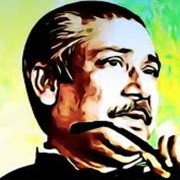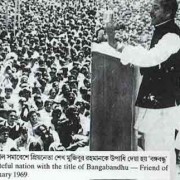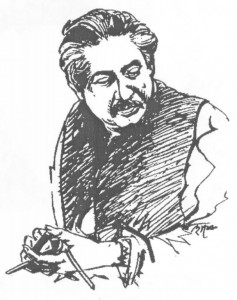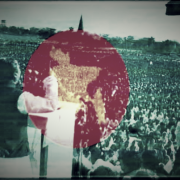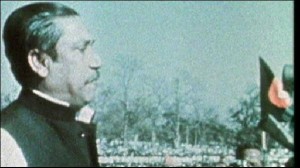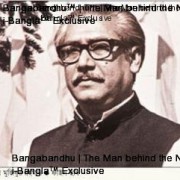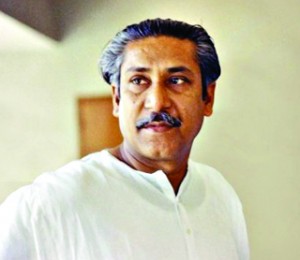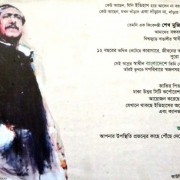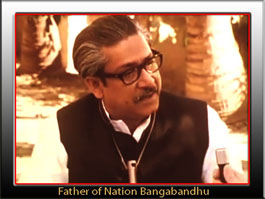 BANGABANDHU Sheikh Mujibur Rahman, with most members of his family, was gunned down in the pre-dawn hours of August 15, 1975. When daylight broke, it was an eerie scene at 32 Dhanmondi, the spot that had been witness to so much of history in the lives of the people of Bangladesh. Bangabandhu’s body, as also those of everyone else, lay where they had fallen the whole day and the night that followed. Soldiers swarmed everywhere. Cameramen, all serving the government at different points, were brought in to record what remains the most gruesome episode in the history of Bangladesh. It was not until the next day that most of the dead were buried in Banani.
BANGABANDHU Sheikh Mujibur Rahman, with most members of his family, was gunned down in the pre-dawn hours of August 15, 1975. When daylight broke, it was an eerie scene at 32 Dhanmondi, the spot that had been witness to so much of history in the lives of the people of Bangladesh. Bangabandhu’s body, as also those of everyone else, lay where they had fallen the whole day and the night that followed. Soldiers swarmed everywhere. Cameramen, all serving the government at different points, were brought in to record what remains the most gruesome episode in the history of Bangladesh. It was not until the next day that most of the dead were buried in Banani.
Bangabandhu’s killers made sure, though, that the Father of the Nation did not find a resting place in the nation’s capital, for there was the danger that his grave would in time become a hallowed spot. They helicoptered his body all the way to his village Tungipara and buried him there hastily and unceremoniously. State-run radio and television then served up an untruth: the dead president, the nation was informed, had been interred with full state honours. It was anything but. Just what dire possibilities the nation was up against came through within moments of the carnage at 32 Dhanmondi. Announcements on the electronic media began with Islamic invocations and ended in similar fashion. What was most pronounced, though, was the alacrity with which Joi Bangla, so long the national slogan, was replaced with the Pakistan-like Bangladesh Zindabad.
It was a Friday when Bangabandhu was murdered. Khondokar Moshtaque, his commerce minister now in the position of president, offered Juma prayers at Baitul Mokarram, a clear indication of the threat secular politics suddenly faced as a result of the bloody coup. In the weeks and months that followed the coup, except for the very brief interregnum of General Khaled Musharraf’s coup d’etat in early November, the principles underlying the 1971 War of Liberation went on a nosedive.
In the five years of General Ziaur Rahman, Bangladesh’s first military ruler, the lurch to the right became too well pronounced to be missed. It was the elderly journalist and Zia loyalist Khondokar Abdul Hamid who spoke for the regime in February 1976. The people of this country, he told a stunned gathering of Bengali intellectuals, would take inspiration from “Bangladeshi nationalism,” a concoction that patently militated against the historically acknowledged Bengali nationalism that had gone into the struggle for autonomy in the 1960s and national independence in 1971.
Bangabandhu’s tragic end remains symptomatic of the ramifications coming from it. In the twenty-one years that elapsed after his death and till the time his party, the Awami League, returned to power under the leadership of his daughter in 1996, it was the entire political nature of the country that went through darkness. Politics mutated into intrigue as the Zia regime permitted the emergence in Bangladesh’s politics of the rightwing forces that had associated themselves with the Pakistan occupation army in 1971.
Leading figures of the Jamaat-e-Islami, the Muslim League and other parties, reviled for their collaborationist roles in 1971, came together to prop up the Zia regime, a united effort that was to throw up in time the Bangladesh Nationalist Party. And with that came something more sinister: a conscious, concerted move to pit Ziaur Rahman, by virtue of his announcement of independence on March 27, 1971, against Sheikh Mujibur Rahman in a brazen effort towards rewriting history. It was conveniently not given about that Zia’s broadcast had repeatedly referred to Bangabandhu as the “great national leader.” For understandable reasons, the Zia speech was never broadcast in all the years he held power.
And power was applied ruthlessly in the Zia years. The period remains noted for the systematic manner in which leading military figures of the War of Liberation were eliminated one after the other. The process, of course, had begun barely three months into the assassination of Bangabandhu Sheikh Mujibur Rahman. On November 3, four leading members of the Mujibnagar provisional government — Syed Nazrul Islam, Tajuddin Ahmed, A.H.M. Quamruzzaman and M. Mansoor Ali — were murdered in Dhaka central jail, whence they had been lodged after August 15, by the very soldiers who had put an end to Bangabandhu’s life.
On November 7, it was the turn of General Khaled Musharraf, a valiant, intellectually oriented soldier reputed for planning military strategy in 1971, to be murdered by troops loyal to Zia. And with him died Colonel Huda and Major Haider, both freedom fighters. In the Zia era, as many as eighteen abortive coups took place, with the plotters subsequently being arrested and swiftly disposed of. The attempted coup by a group of air force men in October 1977 led to summary trials and swift executions.
General Zia died in the nineteenth coup, again a botched one because its leading figure, General M.A. Manzoor, a freedom fighter, proved unable to sustain it. Manzoor was apprehended within days of the Zia killing and was murdered in cold blood by Zia loyalists. In the period following Zia’s death in May 1981, a number of military officers, many of them freedom fighters, were tried in camera and sentenced to death. They were all hanged, twelve in all. Brigadier Mohsinuddin headed the list of the condemned.
Political negativism, as distinct from the liberal ethos that had defined the Mujib years, gained intensity and increasing currency in the Ershad years. For all his personal esteem for Mujib, General Ershad, having taken power in a coup in March 1982, went systematically into the job of a communalisation of the secular Bengali state. He decreed Islam as the state language and cheerfully went into setting up religious motifs on walls all over town.
It was in his time that Bangabandhu’s murderers were permitted to form a so-called political party known as the Freedom Party. Colonel Farook Rahman, one of the leading elements in the August 1975 assassination of Bangabandhu, contested the presidential election of 1988 and even went on television and radio to address the nation. He and his kind were of course being protected by the notorious Indemnity Ordinance which had in 1979 been incorporated into the nation’s constitution by the Zia regime. And, to be sure, the Ershad regime was only furthering the cause of the Zia system.
As one of his earliest moves in power, Zia had tampered with the constitution by doing away with secularism and socialism and bringing in a corrupted form of nationalism. By the time the general elections of June 1996 came round, Bangladesh no more resembled the liberal, nationalistic experiment it had been in 1971 and the three and a half years in which Bangabandhu Sheikh Mujibur Rahman governed.
Bangladesh in the post-Mujib period moved away from its close links with the Soviet Union and India to more cordial ties with the United States. With China and Saudi Arabia according diplomatic recognition to Bangladesh within days of the Mujib murder, the new rulers in Dhaka consciously nurtured ties with the two countries. Pakistan set up its diplomatic mission in Dhaka; Libya offered a home to Bangabandhu’s murderers. At home, Hamidul Haq Chowdhury and Golam Azam, having been Pakistan loyalists in 1971 and having lived in Pakistan during the Mujib years, came back home to reclaim their politics and their property. Khan Abdus Sabur, who on the eve of liberation had described the soon-to-be-born Bangladesh as the illegitimate child of India, took his seat in Bangladesh’s Jatiyo Sangsad.
Suffice it to say that the death of Bangabandhu Sheikh Mujibur Rahman led to Bangladesh’s retreat from the civilised world. The lights went out of our lives. Darkness came over a once vibrant, verdant land.
Author : Syed Badrul Ahsan is Editor, Current Affairs, The Daily Star.
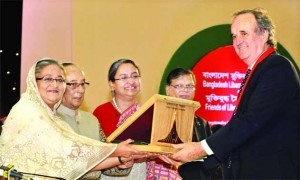 Celebrated BBC journalist Sir William Mark Tully, reputed particularly for his extensive coverage of the LiberationWar, believes Bangabandhu had to steer a new born nation facing more problems than any other leader of that time.“He (Bangabandhu) faced more problems than his contemporary leaders,” Tully said in an interview at his New Delhiresidence ahead of Bangabandhu’s 35th martyrdom anniversary.
Celebrated BBC journalist Sir William Mark Tully, reputed particularly for his extensive coverage of the LiberationWar, believes Bangabandhu had to steer a new born nation facing more problems than any other leader of that time.“He (Bangabandhu) faced more problems than his contemporary leaders,” Tully said in an interview at his New Delhiresidence ahead of Bangabandhu’s 35th martyrdom anniversary.
